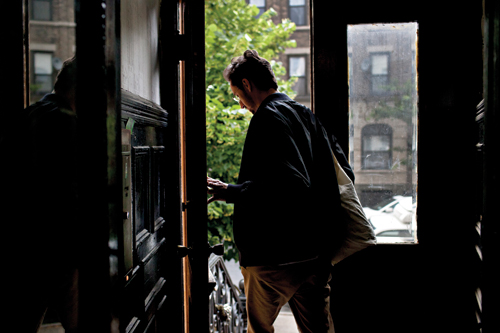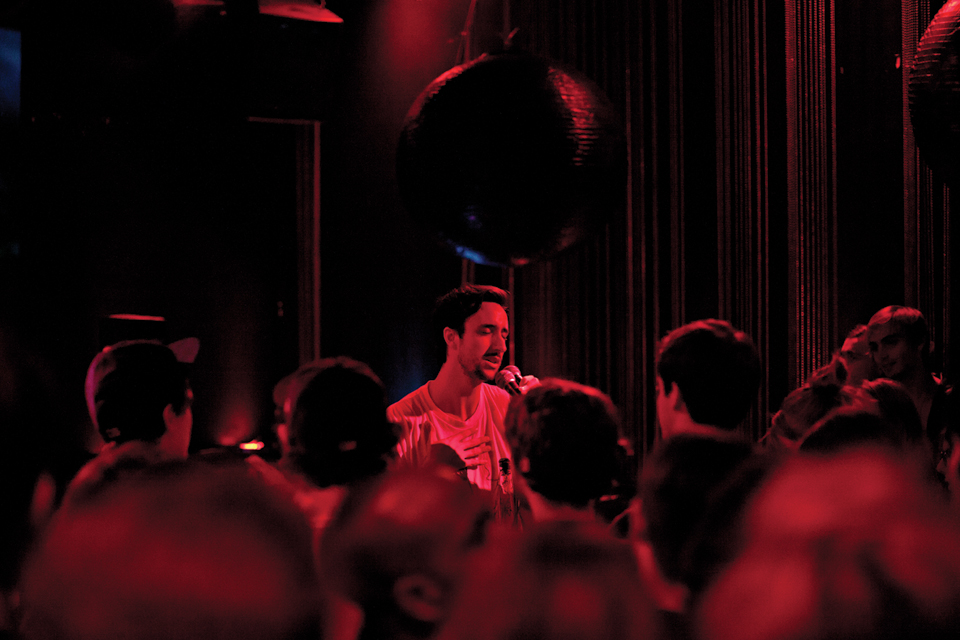How to Dress Well turns the blues into gold.
Stepping out of a minivan in Williamsburg, Brooklyn, Tom Krell looks a little dazed. He’s spent most of the day behind the wheel, zigzagging back down from Montreal for his second New York show of the week, and he’s in need of a shower, or at the very least, a change of clothes. At 28 and lanky with his thin mustache, long face and doleful, puppy dog eyes, he brings to mind a young David Arquette. His manager reminds him of a photo shoot scheduled before the show, so he spritzes cologne under his arms and takes to the road again, this time in a cab bound for Park Slope. When we arrive at the shoot, a stylist leads Krell over to a rack of suits. “I don’t dress up that often,” he says, motioning towards his less-than-stellar outfit of a loose fitting long-sleeved shirt, dark socks and dress boots. She hands him a pair of pants to try on, but he hesitates. “I’m not wearing any underwear,” he confesses sheepishly, so they settle instead on a jacket and shirt. The photographer directs Krell into a back room to change in privacy, and he reemerges a few minutes later, taking his place in front of the camera. “You look so dapper,” she says, satisfied. “I don’t feel dapper,” Krell says. “I ate Taco Bell for lunch.” Undeterred, she offers: “Your fatigue is giving me such a great vibe.” But he’s relentlessly droll: “If it’s any consolation, this is a pretty normal zone for me.”
After the shoot, Krell’s first order of business is solving the underwear problem: he picks out a package of black briefs at an American Apparel in Williamsburg, and walks around the corner to the venue to meet Cameron Reed and Aaron Read, who play laptop/keys and violin/guitar, respectively, in the current live incarnation of Krell’s avant-R&B project, How to Dress Well. The three recount the day’s case of tour van delirium, which found them freestyling perverse country songs to pass the time. “In one, I was in a boat full of broken lightbulbs on an ocean of erection blood,” says Krell. “It got dark—it kind of sucked.”
 By 9PM, the venue has already begun to fill up, and Krell makes his way out onto the stage, where Read and Reed are making last-minute sound adjustments. He thanks the crowd for coming and flashes a boyish grin, looking more at ease than he has all afternoon. “This one is quite quiet and plaintive,” he says, before opening up with “Suicide Dream 1,” which concludes his 2010 debut, Love Remains. Starting with a cool-toned midrange and gradually working his way up to an angelic falsetto, Krell’s voice dances over the murky keys-and-violin melody. He navigates a pair of mics—one dry and one reverby—and shuts his eyes tight; the crowd dutifully hushes. A series of bewitching screen projections, including a shot of a nude woman striding slowly across a darkened bedroom and footage of the late Butoh master Kazuo Ohno, play out behind him, helping to sustain the reverential mood. Delirious whoops shoot out from the crowd. “That’s my dude!” a girl in the front row yells repeatedly, eliciting several bashful smiles from Krell. At one point, she encircles her arm around a stranger, re-stating the catchphrase. Krell digresses with an R. Kelly cover and a few dance-friendly tracks, but it’s a determinedly meditative set. For the encore, he sings a cappella, exploring a golden upper register with the mic slung over his right shoulder. Outside, after the show, fans debrief in a chorus of amazings and incredibles—a scene not dissimilar to his Manhattan show earlier that week. There, Krell performed on the floor, and people crowded him as he sang. No one flinched when a crescendo of imposing static rose up and nearly consumed his voice. He had a good number of admirers that night as well, including a tall man with an angular haircut wearing a Mickey Mouse jacket.
By 9PM, the venue has already begun to fill up, and Krell makes his way out onto the stage, where Read and Reed are making last-minute sound adjustments. He thanks the crowd for coming and flashes a boyish grin, looking more at ease than he has all afternoon. “This one is quite quiet and plaintive,” he says, before opening up with “Suicide Dream 1,” which concludes his 2010 debut, Love Remains. Starting with a cool-toned midrange and gradually working his way up to an angelic falsetto, Krell’s voice dances over the murky keys-and-violin melody. He navigates a pair of mics—one dry and one reverby—and shuts his eyes tight; the crowd dutifully hushes. A series of bewitching screen projections, including a shot of a nude woman striding slowly across a darkened bedroom and footage of the late Butoh master Kazuo Ohno, play out behind him, helping to sustain the reverential mood. Delirious whoops shoot out from the crowd. “That’s my dude!” a girl in the front row yells repeatedly, eliciting several bashful smiles from Krell. At one point, she encircles her arm around a stranger, re-stating the catchphrase. Krell digresses with an R. Kelly cover and a few dance-friendly tracks, but it’s a determinedly meditative set. For the encore, he sings a cappella, exploring a golden upper register with the mic slung over his right shoulder. Outside, after the show, fans debrief in a chorus of amazings and incredibles—a scene not dissimilar to his Manhattan show earlier that week. There, Krell performed on the floor, and people crowded him as he sang. No one flinched when a crescendo of imposing static rose up and nearly consumed his voice. He had a good number of admirers that night as well, including a tall man with an angular haircut wearing a Mickey Mouse jacket.
The next morning, Krell’s up early nursing a hangover. We meet at a donut shop in Greenpoint and conversation turns toward the response to last night’s show. “I was looking at Twitter, and everyone was talking about how [How to Dress Well] was, like, sex music,” he says. When I ask if he agrees, he pauses for a second, and says, “When you enter a certain terrain of intimacy and emotionality and the sensualness of my voice, sex is on the table.” He’s not wrong, but still, How to Dress Well feels miles away from your average R&B radio hit. Nevertheless, he’s a devotee of that music and is quick to praise the quality of the stations in Chicago, where he’s currently living and working toward a PhD in philosophy at DePaul University. It’s with that same scholarly rigor that he digests popular music: scanning the airwaves, looking for a certain emotional punch, which he unpacks with a strange combination of a fan’s zeal and a grad student’s erudition. “Even if you write a good hook, whatever that means, it’s all about the affective transmission,” he says. “Chris Brown has a ton of hooks, but sometimes you can just hear he’s phoning it in. Whereas ‘Deuces,’ that song is quite amorphous—what’s the verse? What’s the refrain? Still, it’s a better pop song than some of the better-hooked songs on the record because of the affective connection.”
 He touches on other hit makers, like Trey Songz (“He’s got a ridiculously good ear”) and The-Dream (“Some of his phrases and shit, you’re just like, ‘Oh my God, Terius! That’s such a Terius-style phrase’”), before turning to musicians on the opposite end of the spectrum, like Xiu Xiu’s Jamie Stewart and Grouper’s Liz Harris, who, like Krell, flaunt their experimental roots while flirting with the tried and true form of writing from real life experience. I ask Krell how autobiographical his own work is, citing “Set It Right,” the emotional centerpiece of his new album Total Loss, which features a litany of I miss you proclamations directed toward various friends and loved ones identified only by first name. He concedes: “Everything I sing about comes from something real. And I think this is something I learned from Xiu Xiu that I hope comes through in ‘Set It Right,’ that it’s personal to the point of being impersonal. It doesn’t matter to you that I miss Faith or Francey, but you miss people in your life. What I hope that you’re going to connect with is the emotional experience. You know this Xiu Xiu song ‘Nieces Pieces?’ It’s, like, the most brutal song ever. [In it] he’s like, I can’t wait to watch you get older/ I can’t wait till you realize mommy’s heart is broken/ I can’t wait to watch you grow up around the people who broke it. What’s interesting is not Jamie Stewart’s story but the experience of thinking, Oh my God, this baby is going to grow up around these people who have a lot of problems. That’s what’s relatable: being a generation with older generations’ stories bearing down on you.”
He touches on other hit makers, like Trey Songz (“He’s got a ridiculously good ear”) and The-Dream (“Some of his phrases and shit, you’re just like, ‘Oh my God, Terius! That’s such a Terius-style phrase’”), before turning to musicians on the opposite end of the spectrum, like Xiu Xiu’s Jamie Stewart and Grouper’s Liz Harris, who, like Krell, flaunt their experimental roots while flirting with the tried and true form of writing from real life experience. I ask Krell how autobiographical his own work is, citing “Set It Right,” the emotional centerpiece of his new album Total Loss, which features a litany of I miss you proclamations directed toward various friends and loved ones identified only by first name. He concedes: “Everything I sing about comes from something real. And I think this is something I learned from Xiu Xiu that I hope comes through in ‘Set It Right,’ that it’s personal to the point of being impersonal. It doesn’t matter to you that I miss Faith or Francey, but you miss people in your life. What I hope that you’re going to connect with is the emotional experience. You know this Xiu Xiu song ‘Nieces Pieces?’ It’s, like, the most brutal song ever. [In it] he’s like, I can’t wait to watch you get older/ I can’t wait till you realize mommy’s heart is broken/ I can’t wait to watch you grow up around the people who broke it. What’s interesting is not Jamie Stewart’s story but the experience of thinking, Oh my God, this baby is going to grow up around these people who have a lot of problems. That’s what’s relatable: being a generation with older generations’ stories bearing down on you.”
Krell goes on to describe a similarly heavy Grouper performance he saw. “I couldn’t believe the control she had,” he says. “To make such a small sound in such a focused way. People were nervous about the ice shifting in their glass because there was such powerful attention. The success or failure of my live show is super contingent on whether or not people are going to pay that kind of attention, to have a couple songs where it’s just very plaintive and slow, where I’ll even sing un-mic-ed. When it comes off, it’s fucking beautiful. Walter Benjamin quotes this French philosopher Malebranche, saying, ‘Attentiveness is the natural prayer of the soul.’ This is a super cosmopolitan, maybe naive thought, but if we could as a group develop a kind of shared attentiveness in realms beyond concert halls, that could be quite monumental.”
Love Remains, the record that earned How to Dress Well his first serious buzz, nods to the flamboyant R&B popular during Krell’s ’90s youth while also embracing the transporting power of crackly, densely packed audio collage. Album opener “You Hold the Water” approximates what it would be like to blast a glassy, unstable drone over Soul for Real’s yearning 1994 smash “Candy Rain” (which Krell samples on the track “Endless Rain”). The songs represent soul music’s unstable isotope; hooky as many of them are, they always tilt toward abstraction. A subsequent EP, Just Once, may have moved How to Dress Well even further away from the “sex music” center, cushioning Krell’s voice with lush strings and piano. But Total Loss is Krell’s most eclectic release to date, with several tracks bordering that radio-ready vibe he’s so attuned to: “& It Was U,” an upbeat, “Don’t worry, baby” finger snapper with heady, multi-tracked vocals; the trip-hoppy vamp “Running Back,” which shows off Krell’s Michael Jackson–style voice percussion; and “Cold Nites,” a brooding track featuring a sample that sounds like a slowed-down sonar ping. But the album also pushes into musique concrète territory. Krell recorded album opener “When I Was In Trouble” in his compartment on a railroad trip from Frankfurt to Cologne, and you can hear bits of train noise first complementing and then later nearly overwhelming the vocals and keyboard. A track like “Set It Right,” which starts out with a moaning, sluggish loop that sounds like an old soul record melting in magma before segueing into the aforementioned I miss you sequence, perfectly encapsulates How to Dress Well’s strange left-field soul alloy. “It’s not a photorealistic shot of a pop song,” Krell says. “I imagine the pop verse structure splayed out impressionistically across the song.”
Total Loss, itself, is the culmination of a long aesthetic arc, a two-decade cultivation of a musical split personality. Krell grew up in Boulder, Colorado and began singing as a boy. “I had a cute little voice,” he says. “So my mom set me up with this sweet hippie woman who would help me learn to sing the songs I loved, like Michael, or All-4-One, or Whitney. I only did this for about a year, but I got to do two recitals—all of her students performing pop songs for their parents. It was sick. I did Shai’s ‘If I Ever Fall in Love.’” But by his teen years, inspired by his older brother, Dan, one of a pair of twins with Asperger syndrome, Krell got interested in metal. “Since I was 10, [Dan’s] been into black metal,” says Krell. “He started a zine and he played the drums. He always insisted that I listen to Burzum instead of Tag Team. I went through a period in my late teens where the way I dealt with having disabled siblings was by being like, Fuck the world; he’s true. Everyone says he’s crazy, but he’s not crazy. He’s a really amazing guy, but a massively frustrated person. I think I wanted to impress him by playing metal.”
 If Krell second-guesses these angsty, adolescent impulses now (he refuses to reveal the names of his various high-school bands—“too risky,” he says), improbably, it’s that early influence playing cathartic, DIY rock that fueled his current love of falsetto. “I went through puberty super late,” he says. “When I would sing in hardcore and metal outfits, and I’d go to scream, it’d be quite high pitched. We gave our demo to some guys on some message board and they were like, ‘Sick—you guys have a female singer?’ I was like, Fuck you guys! I sang high, and then my voice dropped, and I continued to sing high, and it became falsetto.”
If Krell second-guesses these angsty, adolescent impulses now (he refuses to reveal the names of his various high-school bands—“too risky,” he says), improbably, it’s that early influence playing cathartic, DIY rock that fueled his current love of falsetto. “I went through puberty super late,” he says. “When I would sing in hardcore and metal outfits, and I’d go to scream, it’d be quite high pitched. We gave our demo to some guys on some message board and they were like, ‘Sick—you guys have a female singer?’ I was like, Fuck you guys! I sang high, and then my voice dropped, and I continued to sing high, and it became falsetto.”
It wasn’t until undergrad at Cornell College in Iowa that Krell began making his first solo recordings. He started out working in what he describes as “Elliott Smith-style songs,” but then he heard seminal experimentalists Wolf Eyes and caught the noise bug. The summer after his sophomore year, while browsing a used bookstore in Minneapolis, he picked up a vintage fashion manual called How to Dress Well and adopted the moniker for his sonic experiments, which collaged together guitar, voice and harsh electronics, a sound he held on to when he headed to New York in 2006 to pursue a philosophy MA at the New School. Playing back a glitchy acoustic piece that dates back to this early period, Krell seems unimpressed. “Now when I listen to this, there’s a defensive posture guiding it,” he says. “Where there could be a really tender moment, I would fuck it up and go, like, Aaargh!” Krell even devised a deliberately off-putting alias, cokc dokc, to mask some of his more esoteric productions, a move he also writes off as a “failsafe mechanism.” “It seems to me that I was basically afraid,” he says. “If people didn’t like the songs, I could say, ‘You think I really care? I called this shit cokc dokc!’”
During the summer of 2009, Krell, then living in Brooklyn, began obsessively listening to “Right Side of My Brain,” The-Dream’s lush ode to romantic delirium from his Love vs. Money LP, and it spurred a shift in How to Dress Well. “I remember sitting in my living room, sweating and singing, and really feeling like I had made a new step,” he says of recording the buoyant, fuzzed-out pop track “Kidnap City” (which he’d later remake and include as a bonus track on the Love Remains vinyl). “I’m just a tall, skinny Jewish guy, but I’m singing R&B,” he says, reflecting on the epiphany. “And to do that and be, like, Yeah, that’s what feels right, took a long time.” This breakthrough spawned an intensive new recording spurt, which coincided with Krell moving abroad to study 18th- and 19th-century idealism at the University of Bonn in Germany. There he produced seven self-issued EPs over the course of eight months, many of which provided the raw material for Love Remains. A deep cut from Mariah Carey’s Memoirs of an Imperfect Angel served as another major inspiration. “There’s an interlude on ‘Angel (The Prelude)’ that I couldn’t believe when I first heard it,” he says. “There’s no hook or anything; it’s just her using her voice in all these different ways over a beat. I remember thinking, There’s nothing else like this.” You can hear that wonder in Love Remains tracks like “Ready for the World,” a downtempo groove piece whose warped, static-kissed texture can’t contain its unabashed sensuousness. But just as Krell was exploiting his newfound R&B aesthetic, personal tragedy blindsided him. Mere days before the release of Love Remains, Krell’s best friend, Ryan Hitchon, died in his sleep, his heart stopping under unexplained circumstances. “He never got to really sit down and hear the record with me, because I was in Germany that whole year,” Krell says. “It was an abrupt truncation of a path I thought was just going on.”
The episode triggered a serious bout of depression, but it also served as fruitful inspiration. If Krell had already been working in a cathartic mode, his next release, Just Once, treated grief as a holy phenomenon. The strings-abetted “Suicide Dream 2 (Orchestral Version),” a reworking of a track from Love Remains, plays like a gospel-infused take on Antony and the Johnsons’ sumptuous alt-soul. Though the song was written before Hitchon’s death, the lyrics scan as a meditation on mourning: It’s like there’s no air. On a similarly revamped “Suicide Dream 1,” Krell addresses a poignant corollary to his friend’s passing: Before his death, Hitchon had fathered a child, who is currently alive and well. In tribute, Krell appended a new verse to the song: Man, I can’t believe you had a baby/ But that’s some shit that life goes on. In a recent rehearsal, Krell surprised himself with a lyrical slip. “Completely, as if by the will of the song, I sang, by accident, That’s the shit that life goes on, and I felt the warmest, most beautiful, mournful feeling,” he says. It’s a small linguistic twist, but in light of the heavy psychic baggage Krell has been toting, a momentous one. For Krell, an academic heavily attuned to the way words can set off emotional fireworks in a performer and listener alike, it was a eureka moment. “You don’t get over melancholy by denying it,” he explains. “You get over it by learning how to sustain loss creatively.”
 This idea serves as a key guiding principle for Total Loss. “I find it largely to be a happy record.” he says. “Music is a huge therapeutic vehicle for me. Being surrounded by disability and mental illness when you’re a little boy, it’s quite hard to understand what it means; you just love these people. I grew up and became quite negative. Spiritually metabolizing these things, I’ve come to realize that I need to practice openness like it’s a sport. I think it would be such a shame to feel life as a burden the only time I get to live it. For me, the openness of my live show is a symbol of and a really important site of my work to fight negativity and depression and self-enclosedness, and really fight for intimacy and community.”
This idea serves as a key guiding principle for Total Loss. “I find it largely to be a happy record.” he says. “Music is a huge therapeutic vehicle for me. Being surrounded by disability and mental illness when you’re a little boy, it’s quite hard to understand what it means; you just love these people. I grew up and became quite negative. Spiritually metabolizing these things, I’ve come to realize that I need to practice openness like it’s a sport. I think it would be such a shame to feel life as a burden the only time I get to live it. For me, the openness of my live show is a symbol of and a really important site of my work to fight negativity and depression and self-enclosedness, and really fight for intimacy and community.”
As a history-of-philosophy junkie and an R&B eccentric, Krell has few logical peers, and when you hear him discuss his in-progress dissertation—“a history of German idealism from 1781 to 1842”—his need for this kind of all-heart outlet becomes clearer. “The hunch is that we can understand the transitions in the German idealist trajectory if we use the thread of nihilism,” he explains. “I read Kant and Jacobi, then I write about Hegel’s big Science of Logic, then I write about some of the last work of Schelling.” The research is clearly a labor of love (“If you’re in [academia] as a trade school, you’re fuckin’ crazy,” he says, pondering the grim job market that he’d face if he tries to pursue a teaching career), but it isn’t exactly a vacation from life’s big questions either. Because Krell doesn’t fit readily into any specific scene, he has had to create his own, a disparate group of well-respected musicians with whom he’s forged personal bonds. He says he’s planning a collaboration with Xiu Xiu’s Jamie Stewart, and that he went to the gym with fellow ethereal-soul purveyor Michael Diamond of Blood Diamonds in Vancouver and lunched with Frank Ocean in LA. “Frank and I have the same people in our camps, and they said, ‘You should meet up with him,’” recalls Krell of the latter encounter. “I was at a friend’s house, and [Ocean] and his little cousin came and picked me up, and we went and had some weird organic burgers and fries. I had my iPad, and this is before I had done any of the vocals for Total Loss, so I just played my whole record and sang along with it from front to back. Frank was super attentive. Both he and his little cousin had their hands on their chins, heads nodding, occasionally looking up at me but just patiently listening. And then after every song, saying, ‘That’s tight.’”
Krell has also been forging strong bonds in the experimental-music world, including a collaborative friendship with Pete Swanson, a noise-reared sound sculptor. Swanson mastered Just Once, and he made his presence felt at Krell’s concert earlier in the week, planting himself in the front row, beaming and nodding his head in approval. “He kept patting me on the back—did you see?” Krell asks proudly. “If the ethos of noise is just to throw yourself out there spiritually, to visibly rend yourself in public, then there should be a recognized commonality between what Prurient does and [what I do] standing there literally six inches from 100 faces singing my heart out in this alien voice. Pete sees that.”
Krell relishes these connections, but he doesn’t expect to feel fully comfortable in a specific niche anytime soon. “I would be so stoked if I ever got a song on rap and R&B radio. I would love it if people who vibe to Trey Songz…,” he says, trailing off as if daydreaming about a certain level of mass appeal. “But that’s not my goal, per se. I just don’t think of myself as within a given genre. I would prefer to be in an iTunes playlist with ‘X’s & O’s’ by Jeremih, a couple Terry Riley songs, a Mount Eerie song and maybe a super emotional rap song like ‘Fuck This Industry’ by Waka Flocka.” Krell’s playlist fantasy doesn’t seem that far off base, nor does his prophecy for the future of How to Dress Well. In his head, he’s already zooming years ahead, to the third, fourth and fifth LPs. “I want to follow this music absolutely as far as possible,” he says. “I want to make something ridiculously beautiful.” It seems almost unnecessary to point out that he already has.


